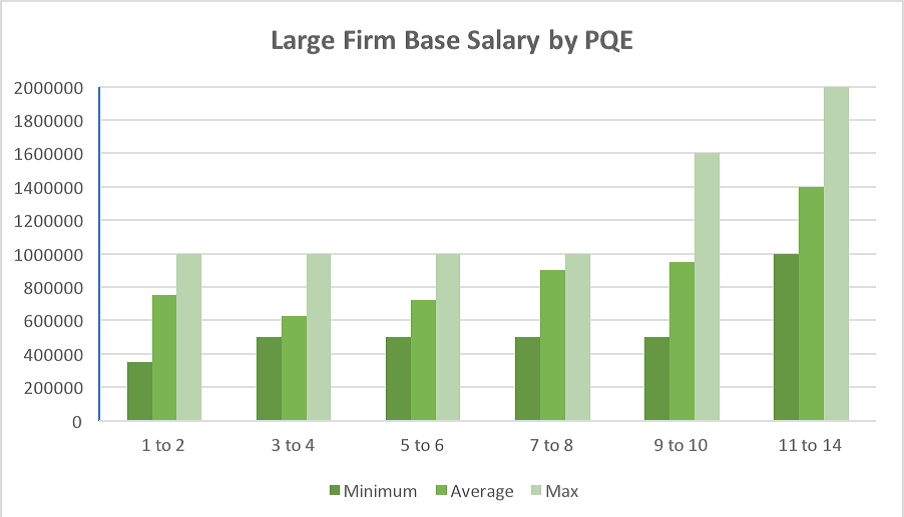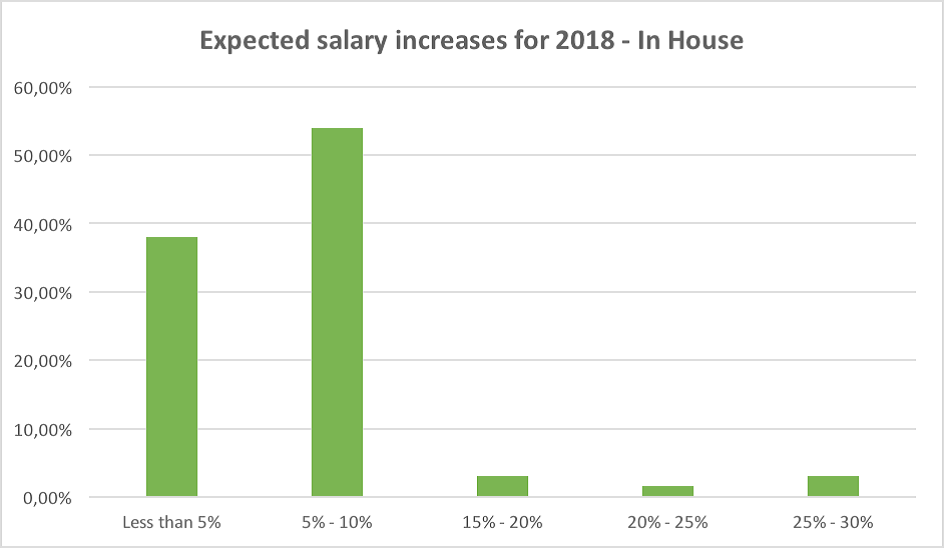Salary survey for the South African legal sector 2017/2018

29 Jan 2018
Once again, 2017-2018 has seen a number of changes within the legal sector in Southern Africa and with those changes come the accompanying changes to salaries. Below is our breakdown of salaries and survey results for the South African legal market. The survey was conducted in December 2017 and over 1000 participants took part.
THE VIEW FROM PRIVATE PRACTICE
How was the legal job market in South Africa?
The international markets made further introductions into Africa. The international law firms established local clients with a focus on project finance and construction. DLA Piper and Pinsent Masons are acting as independent law firms in a competing environment with great success. Herbert Smith Freehills introduced their respective alternative legal services platform to South Africa, and the feedback has been well received.
In the junior to mid-senior market, the movement remained constant. Again, junior lawyers are moving in-between the larger law firms either to gain greater exposure or to seek a form of cultural change. The mid-senior lawyers are moving to the international law firms to gain exposure to a broader set of clients internationally with the possibility of secondment opportunities abroad.
Looking at the hires over the past year – how has the market evolved?
In our view the local firms need to have a look at what the international firms are doing. They are recognized for being specialist in certain markets or fields of law. Acting as a general law firm, with a full-service offering, does have substantive advantages and disadvantages. The overheads for covering departments which is not performing on an annual basis puts more pressure on the succeeding departments. This creates unfavourable working environments where the profitable lawyers are looking to make a move because of the unrealistic expectations from the non-succeeding departments. The local firms need to establish greater communication between the business developers and the lawyers, in order to sell the brand more effectively. In 2018 it would be interesting to see how the local firms implement strategies across Africa to maintain a competitive advantage.
What happened to private practice salaries?
Once again, salaries in the South African market have taken their lead from the health of the local economy and political instability. A number of large firms were only giving inflationary increases and in some support roles the increases were not even at inflation.
There is always going to be the challenge of keeping key individuals happy and in these cases, there are instances of larger percentage increases, though these are often justified as being promotions rather than simple increases.
At more senior levels, there have been instances of salary freezes and/or a request from Partners to recapitalize the firm. This can and has led to some discontent.
What were bonuses like?
According to our market research within private practice, 37.8% of respondents indicated their firm makes provisions for a bonus, 1% said no bonus structure was in place while 1% of respondents gave no indication. Of the positive respondents, the overall majority (51.39%) considered the criteria for bonus to be challenging, 27.72% said it was easy and 20.83% of respondents said the criteria is impossible. In my view, the outcome of impossible bonus structures is either thanks to company budgets or the certain role which the individual is currently occupying. 30% of International firms are remunerating lawyers on a commission base only. For that reason, the fees earned by the associate should generate its own 13th cheque in a 12 month cycle.
ACTIVE AREAS
What have been the most active practice areas within private practice in the last year?
Banking and Finance did very well again the past year. The project industry has picked up since year end 2016 and beginning 2017. Alternative dispute resolution (ADR) is still making headway with litigation as main focus for some of the large firms. Companies are focusing on protecting the brand in uncertain times. This will give any litigation department a handful of mandates every quarter.
PROJECTIONS 2018
What are the projections for 2017-2018 for the private practice job market?
Again, we anticipate interest in litigation (insolvency and business rescue particularly) will remain high. We are also anticipating an upswing in M&A (Competition) activity toward the middle of 2018 carrying through into 2019. Most firms welcome the recent changes in the M&A field, although others are strongly opposed to it. There are just too many companies sitting on ever increasing war chests and sooner or later shareholders are going to want to see something done with that capital. With Discovery Group being awarded a banking licence, we may see a different trend in the larger firms with this new possible entry to the market.
What will be the specific growth areas?
In the short term, litigation and ADR, but in the medium terms we see banking/finance being active and M&A projects
Will salaries rise?
Once again, we don’t anticipate a major rise in salaries. New entrants may push market related salaries up in the short term, but by seeking the advice of local recruitment agencies we believe they should be able to attract the right talent by paying similar market related salaries. In the economic times we find ourselves, any double-digit percentage increase should be considered a good increase.
According to the results of our survey, below are the expectations of current employees within private practice. As is shown, the majority share of individuals expected rises of 5% to 10%. This can be justified in that this group are on the threshold of promotion from one tier to another. In instances like this, a greater than normal salary rise can be expected. Our predictions are therefore in-line with the data we have collected.
In assessing where salaries may go in 2018, one needs to consider what salaries were for 2017-2018.
In this regard, below are four graphs setting out the minimum, average and maximum for varying levels of seniority (years of post-qualified/articles experience, PQE) within large, medium to small and boutique firms.
In reviewing some of the graphs, please note at the more senior end of the spectrum it is not practical to give an upper range as the salaries can vary substantially. In such an instance, it needs to be analysed on a case by case basis and one of our consultants will happily discuss this with you should you require such information.


 PROMOTION
PROMOTION
Where are the best promotion opportunities for ambitious legal professionals?
For young ambitious professionals who are still able to choose a new direction, our advice would depend on the firm. If you are at one of the large traditional firms, the momentum is shifting even more towards a corporate/commercial focus. If this is not an area of interest to you, then join a firm that has as its primary or secondary focus in an area of law that you already specialise in or intend specialising in. There are options out there and we will happily provide you with guidance as to a likely best suitor.
Is 2018 a good time to move jobs in private practice?
Each year we are asked the same question and we guess the answer is very much dependent on the individual. If the individual feels that they are not growing professionally, then a change can certainly help to re-energise and focus. Other instances are when a particular sector is under pressure and the probability for promotion is not too positive in the short to medium term. Whilst internal moves could be possible, be mindful of being called on by your former department to assist while still trying to make the shift into a new stream. This can cause issues with your new and old team. Rather make a move to a new law firm where you are only known for that which you are placed for.
THE VIEW FROM IN-HOUSE
How was the in-house & compliance market in South Africa?
At more junior levels, there was continued interest in varying sectors throughout 2017-2018. However, at intermediate levels positions were less prevalent and were more often than not restricted to employment equity appointments only. Senior and heads of legal roles will always pop up throughout the year and this past year was no different. The pharmaceutical industry had a focus on hiring at top level throughout the year. Compliance management in conjunction with corporate governance keeps developing. Candidates should be aware of all the changes or they might find themselves in the unfortunate position of being named ‘redundant’. One of the most recent developments could be found in the King IV Report. Companies and candidates should make it an objective to implement these standards sooner rather than later.
What have been the most active areas in the past year?
At junior generalist levels, financial services are often looking for talent in legal and compliance. Regulatory and legislative changes affecting the likes of asset management and anti-corruption have also seen a new interest in these areas of legal and compliance, with some companies creating new desks to service these areas. This was particularly so for multinational companies having offices in Europe and/or North America. I anticipate this will continue to be an area of interest this coming year.
As previously stated, the pharmaceutical industry made a lot of changes by hiring top talent. The larger law firms will also benefit from the recent hires due to external council preferences.
Cape town is sowing innovation with technology companies form aboard approaching the market. A couple of junior hires took place in this industry. We may predict that senior level placements will follow this year.
What were bonuses like?
Of all in-house respondents to complete our survey, 88.64% advised that provision is made for a bonus and only 11.63% saying no such provision exists. Similar to that of the previous year.
Moving in-house is happening regularly; what can people expect in terms of salary when doing so?
Typically, attorneys with 0 to 3 years PQE can expect a decent increase when moving from private practice to an in-house position across sectors. From 4 to perhaps 8 years PQE a move in-house is likely to see a lateral salary shift. However, in-house positions usually offer additional benefits which need to be considered and there is a perception that work life balance is better working in-house. On a junior level one may not be eligible for a profit share scheme as you might find at the boutique law firms.
What advice would you give someone in private practice looking to move in-house?
Our advice has always been to gain a few years PQE working in private practice before considering a move in-house. Those years are invaluable and can certainly help to fast track your career. More often than not, those who spend additional years in private practice before moving in-house will be appointed into a more senior position quicker than those with the same number of years’ experience who moved in-house sooner.
PROJECTION 2018
What are the projections for 2017-2018 for the in-house & compliance market?
The market is still tough due to economic uncertainty. Furthermore, with the inception of LOC’s, some legal teams are choosing to reduce the size of internal legal teams and outsource the legal function on a case by case basis. While we anticipate an increase in LOC activity, we are still of the opinion that competent permanent in-house counsel will be a cost benefit to a company.
As things currently stand, many of the large corporates are not really hiring and many of the other sectors are under extreme pressure to cut costs too. The new BBBEE codes are also playing a significant part on appointments at all levels as well as procurement spend. Normally, legal departments are seen as cost centres which make them one of the first targets of any cost cutting exercise. Last in, first out may be a policy worth considering when doing your own due diligence into a potential employer. In this regard, please contact us if you would like some objective advice about any such move, even if we are not representing you, we are open to assisting you to make the right move at the right time.
Anticipated salary increases
Much like for private practice, we don’t anticipate dramatic salary increases. For in-house, we predict the majority of increases will be inflation targeted. According to our survey of lawyers working in-house, the overwhelming number of respondents seem to share our thoughts with almost 65% of respondents expecting an increase less than 7.5%, as can be seen in the below graph.
Regarding the current salaries within the in-house environment, below is a graph setting out actual minimum, average and maximum figures as received by respondents to our survey.
Please note: the salary ranges for the above “in-house” graph are not industry specific and are merely based on the number of years PQE.
Bonus
For bonuses within in-house, about 90% of in-house respondents indicated their employer provides for a bonus of sorts. Of the respondents, only 38.71% said achieving the bonus was easy with 9.68% saying it was impossible. That left a healthy majority of 51.61% saying that it was challenging to achieve the bonus targets.
Finally, almost 70% of respondents believe the bonus provided for is adequate whilst just more than 30% feel it is inadequate.
In closing, the data we received from respondents to our survey was extensive and the nature of this report cannot examine all facets. We are happy to arrange a consultation to discuss some of the findings or to perhaps discuss any particular point(s) you wish to discuss. In this regard, please contact our Cape Town office or Darius Zeederberg at [email protected] to arrange such a discussion.
Click here for: Partner focus salary survey 2017/2018
Click here for: Legal salary survey 2017
(This article is provided for informational purposes only and not for the purpose of providing legal advice. For more information on the topic, please contact the author/s or the relevant provider.)






